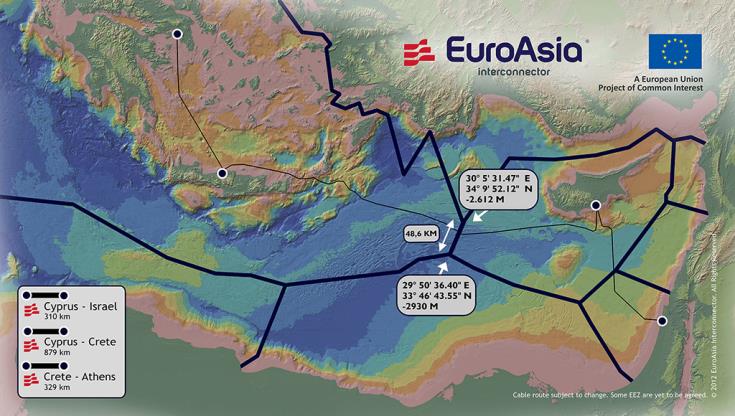Cypriot venture EuroAsia Interconnector said it is ready to resolve any disagreement with Athens to ensure that an EU-backed energy project stays on track to connect the power grids of Cyprus-Crete and mainland Greece by 2022.
A similar appeal was made by the EU’s Energy Directorate chief and Cyprus regulators on February 27 (joint announcement), as well as the Cyprus Ministry of Energy that urged Greece not to isolate Cyprus.
EuroAsia sounded the alarm of unavoidable lengthy delays, or worse, project risk following a recent decision by Greek transmissions system operator, ADMIE, to go it alone with the Crete-Attica section of the project and abandon co-operation with the Cypriot project promoter.
This was done even though there is a political commitment from the governments of Cyprus and Greece to build an electricity interconnector that ensures the security of supply and cleaner energy.
The Cypriot firm argues that by Greece going it alone to promote a “national project” – rather than an EU Project of Common Interest – Greek consumers will be burdened with an additional €450 m cost while jeopardising efforts to lift Cyprus from energy isolation.
After Greek officials blamed EuroAsia for the current impasse, the company has issued a document clarifying the state of play.
It puts the record straight regarding the financing of the Israel-Cyprus-Greece project, especially the €1.1 b Crete-Attica link, as well as the need for the Cyprus and Greek sides to agree on a technical commonality. This being the interoperability of the 1000MW cable and the four converter stations that have to be built, connecting Israeli energy to the continental European electricity grid.
EuroAsia refutes any notion, as implied by ADMIE, that it is the Cypriot side that refuses to cooperate, by not signing a shareholders’ agreement for the new “national project”.
“The delays in the implementation of the project are due to the Greek side’s failure to accept the agreed Roadmap as proposed by the European Commission,” said EuroAsia in a statement.
Moreover, Energy Commissioner Manuel Arias Canete warned Greece in January that going it alone would mean violating all European agreements that could be subject to infringement procedures.
EuroAsia argues that if previously agreed guidelines were followed, it would have already awarded tenders and reached the construction phase, comfortably meeting the mid-2022 deadline for the Crete-Attica link.
It said unilateral decisions by Greece will not resolve the delays but jeopardise the entire project at an additional financial cost to Cypriot and Greek consumers.






